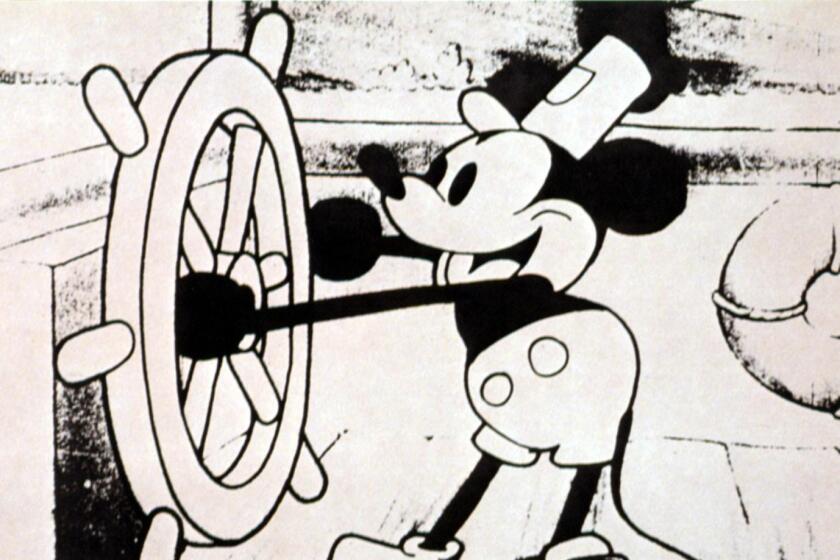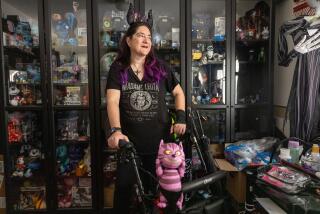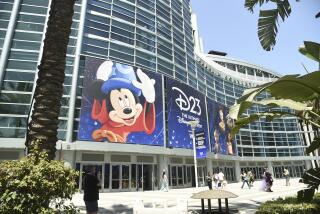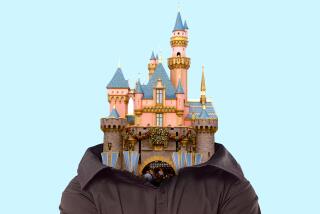Disney boosts LGBTQ support, debuts âPride Collectionâ
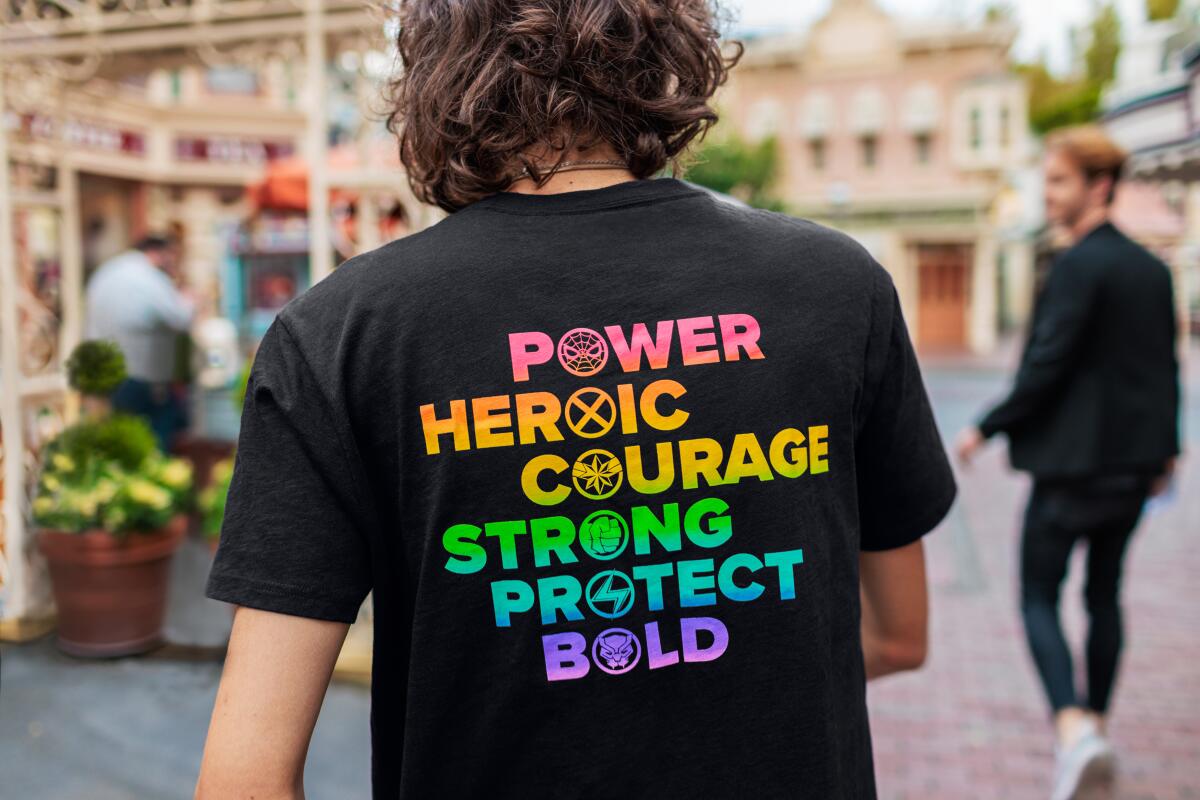
For years, Walt Disney Co. has courted LGBTQ+ visitors to its theme parks, selling rainbow-colored souvenirs and hosting groups that organize annual âGay Daysâ celebrations.
But Disney this week started marketing and promoting merchandise under the name Pride Collection for the first time, a big branding move for a company that has become a conservative target for its support of LGBTQ+ rights.
Profits from sales of T-shirts, Mickey Mouse ears, plush toys and other souvenirs in the newly branded collection will be donated to a select group of LGBTQ+ advocacy organizations through the end of June, the company said.
The move comes as Disney faces mounting criticism and scorn from conservative lawmakers and others who say the company has oversize influence on children, and American culture at large, and is pushing a progressive agenda they oppose.
âThe Disney Pride Collection was created by LGBTQIA+ employees and allies at The Walt Disney Company and is a reflection of their incredible contributions and place at the heart of the company,â the company said on its website. âWe stand in solidarity with our LGBTQIA+ community everywhere.â
Republicans took away Disneyâs special status in Florida. Now theyâre gunning for Mickey himself
Disneyâs copyright protection for the 1928 version of Mickey Mouse will expire in 2024, and Republicans want to make sure of it. Does it matter?
Disney began to feel the wrath of conservative lawmakers several months ago when Chief Executive Bob Chapek voiced opposition to Floridaâs Parental Rights in Education law, legislation more commonly known by critics as the âDonât Say Gayâ law. It has since been cast by conservatives as a cultural force to be stopped.
A Disney representative said the decision to market the Pride Collection did not come in response to the recent outcry from conservative critics. The manufacture of Disney merchandise takes months to design, produce and ship, and the Pride Collection was conceived months ago, as part of the companyâs âongoing evolution,â the representative said.
In 1985, Disneyland quietly reversed a long-held policy of prohibiting partners of the same sex from dancing together at the âHappiest Place on Earth.â Ten years later, Disney began offering health benefits to same-sex couples, after many other Hollywood companies took the step.
The company began to sell rainbow-themed merchandise in 2018.
Disney executives declined to comment publicly about the Pride Collection but referred to a blog post published Monday by Lisa Becket, senior vice president for global marketing, who described herself as a member of the LGBTQIA+ community.
In the post titled âShare Your Pride,â Becket said she is proud to work for a âcompany that supports inclusion as a core value and provides a welcoming environment which allows me to bring my true authentic self to work.â
She said the collection was âdreamed up and designed by members and allies of the community, for members and allies of the community,â adding that the Pride Collection shows the company is âfurther deepening our supportâ for the LGBTQIA+ community.
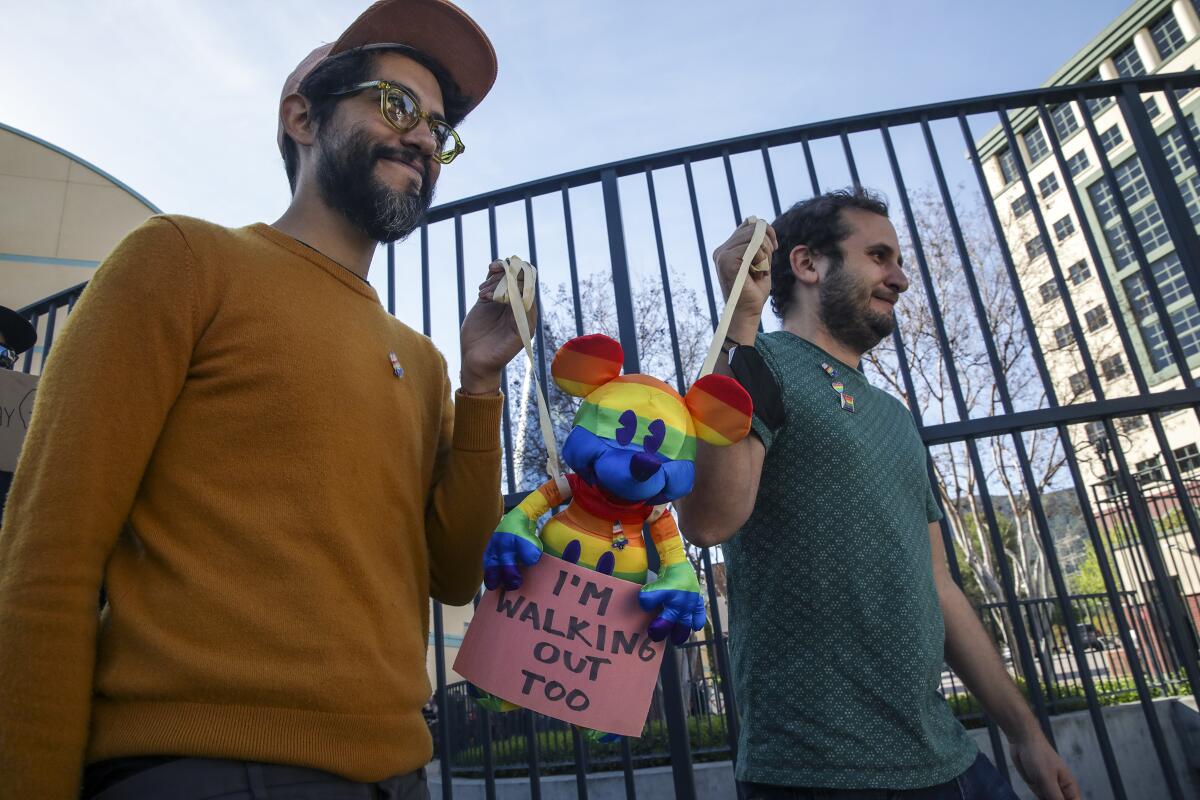
People who commented on the public post were enthusiastic. âTHIS IS HOW ITâS DONE! And the merch is FIERCE! Bravo, Disney. Legacy is [on] your side. Thank you,â one comment reads.
On social media, news of the Pride Collection drew praise and scorn.
A Twitter post on an account described as a Disneyland food blog that showed a picture of a Pride Collection marketing sign generated a range of responses, from âStep in the right direction Disneyâ to âSorry, but we will be no longer supporting WOKE Disney world. Disney should stick to entertainment and out of politics. We traditional families MATTER, too.â
One of Disneyâs largest sources of revenue is merchandise licensing and retail sales, which generated about $4.2 billion in 2021, according to the companyâs latest annual report.
And there may be a business case in supporting LGBTQ+ park visitors, according to the findings of a recent survey of Grindr dating app users that said LGBTQ+ travelers spend $100 billion a year in the U.S. alone. A 2019 survey of LGBTQ travelers found that 11% visited theme parks in the previous 12 months.
Other theme parks have moved in recent years to publicly support their LGBTQ+ visitors.
Universal Studios Hollywood is the annual site of a gay pride celebration known as âPride Is Universal.â Itâs not listed on the parkâs calendar, but in 2019 the park posted its first Twitter announcement about the event.
That year, the park also sold for the first time T-shirts and other merchandise emblazoned with the âLove Is Universalâ logo during the event. Proceeds from ticket sales helped support housing programs for people with AIDS and scholarships for students studying LGBTQ+ issues.
For years, Disneyland and Walt Disney World in Florida have been the site of âGay Daysâ celebrations that have drawn thousands of members of the LGBTQ+ community.
The events take place in the parks but are organized by outside groups. âGay Daysâ events attract about 30,000 visitors each year to Anaheimâs Disneyland Resort, according to organizers. This year the event is scheduled for Sept. 16-18 at Disneyland.
Eddie Shapiro, who launched âGay Days Anaheimâ with his friend Jeffrey Epstein, called the Pride Collection a âstep in the right directionâ and said he expects to see Disney continue to support the LGBTQ+ community and stop contributing to the campaign coffers of conservatives who demonize the acceptance of gay and lesbian couples.
âThe world has evolved and so too has the Walt Disney Co.,â Shapiro said.
Daan Colijn, who runs a gay travel blog with his partner, Karl Krause, applauded Disneyâs move, calling the company an LGBTQ+ ally.
âWith rebranding the rainbow merchandise into the new Disney Pride Collection, and donating 100% of the profits during Pride Month, Disney is sending out a clearer message about supporting the LGBTQ+ community which we take as a win,â he said.
More to Read
Inside the business of entertainment
The Wide Shot brings you news, analysis and insights on everything from streaming wars to production â and what it all means for the future.
You may occasionally receive promotional content from the Los Angeles Times.
